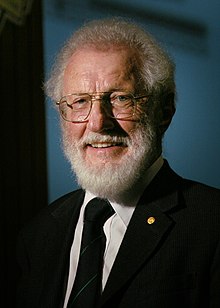Herbert Kroemer
Herbert Kroemer | |
|---|---|
 Kroemer in 2008 | |
| Born | August 25, 1928 |
| Died | March 8, 2024 (aged 95) |
| Nationality | Germany United States (from 2003)[2] |
| Alma mater | University of Jena University of Göttingen |
| Known for | Drift-field transistor Double-heterostructure laser Heterojunction bipolar transistor |
| Awards | J J Ebers Award (1973) Humboldt Research Award (1994) Nobel Prize in Physics (2000) IEEE Medal of Honor[1](2002) |
| Scientific career | |
| Fields | Electrical Engineering, Applied Physics |
| Institutions | Fernmeldetechnisches Zentralamt RCA Laboratories Varian Associates University of Colorado University of California, Santa Barbara |
| Thesis | Zur Theorie des Germaniumgleichrichters und des Transistors : Ausz. Mit 10 Fig. im Text (1953) |
| Doctoral advisor | Fritz Sauter |
Herbert Kroemer (German: [ˈhɛʁbɛʁt ˈkʁøːmɐ] ; August 25, 1928 – March 8, 2024) was a German-American physicist who, along with Zhores Alferov, received the Nobel Prize in Physics in 2000 for "developing semiconductor heterostructures used in high-speed- and opto-electronics". Kroemer was professor emeritus of electrical and computer engineering at the University of California, Santa Barbara, having received his Ph.D. in theoretical physics in 1952 from the University of Göttingen, Germany, with a dissertation on hot electron effects in the then-new transistor.[3] His research into transistors was a stepping stone to the later development of mobile phone technologies.
Early life
[edit]Born to a working-class family in Weimar, Germany, Kroemer excelled in physics at school, letting him advance faster than his peers in the subject.[4]
Career
[edit]Kroemer worked in a number of research laboratories in Germany and the United States and taught electrical engineering at the University of Colorado from 1968 to 1976. He joined the UCSB faculty in 1976, focusing its semiconductor research program on the emerging compound semiconductor technology rather than on mainstream silicon technology. Charles Kittel had published the successful Thermal Physics in 1969, and enlisted Kroemer to edit it for a second edition, which appeared in 1980.
He is also the author of the textbook Quantum Mechanics for Engineering, Materials Science and Applied Physics.[5]
Kroemer was elected as a member into the National Academy of Engineering in 1997 for conception of the semiconductor heterostructure transistor and laser, and for leadership in semiconductor materials technology. He was also elected a member of the National Academy of Sciences in 2003.
Kroemer always preferred to work on problems that are ahead of mainstream technology, inventing the drift transistor in the 1950s and being the first to point out that advantages could be gained in various semiconductor devices by incorporating heterojunctions. Most notably, though, in 1963 he proposed the concept of the double-heterostructure laser, which is now a central concept in the field of semiconductor lasers. Kroemer became an early pioneer in molecular beam epitaxy, concentrating on applying the technology to untried new materials.
Personal life
[edit]Kroemer was an atheist.[6] He died on March 8, 2024, at the age of 95.[7][8][9][10]
Awards and honors
[edit]- J J Ebers Award (1973)
- Humboldt Research Award (1994)
- Nobel Prize in Physics (2000)
- Golden Plate Award of the American Academy of Achievement (2001)[11]
- IEEE Medal of Honor (2002)[12]
See also
[edit]References
[edit]- ^ "Herbert Kroemer". IEEE Global History Network. IEEE. Retrieved 10 August 2011.
- ^ Yang, Henry T. (12 March 2024). "Sad News – Professor Emeritus Herbert Kroemer". chancellor.ucsb.edu. University of California, Santa Barbara. Retrieved 6 October 2024.
- ^ Kroemer, Herbert (1953). Zur Theorie des Germaniumgleichrichters und des Transistors : Ausz. Mit 10 Fig. im Text (PhD). University of Göttingen. OCLC 73916980.
- ^ "Herbert Kroemer - Science Video Interview".
- ^ H. Kroemer, Quantum Mechanics, Prentice Hall (1994)
- ^ Kroemer, Herbert. "Herbert Kroemer – Science Video Interview". Interviewer: "You have no belief in a afterlife?" Kroemer: "That's correct." Interviewer: "...You don't see the evidence of a designer?" Kroemer: "No, I don't." Interviewer: "Could you say more about it?" Kroemer: "I think it's just wishful thinking."
- ^ "Nobel Laureate Herb Kroemer, 1928–2024". UC Santa Barbara Engineering. 12 March 2024. Retrieved 13 March 2024.
- ^ "Sad News – Professor Emeritus Herbert Kroemer". UC Santa Barbara Office of the Chancellor. 12 March 2024. Retrieved 13 March 2024.
- ^ "Nachruf: Herbert Kroemer". Der Spiegel. 15 March 2024.
- ^ https://www.washingtonpost.com/obituaries/2024/03/28/herbert-kroemer-dead/
- ^ "Golden Plate Awardees of the American Academy of Achievement". www.achievement.org. American Academy of Achievement.
- ^ "Herbert Kroemer". IEEE Global History Network. IEEE. Retrieved 10 August 2011.
External links
[edit] Quotations related to Herbert Kroemer at Wikiquote
Quotations related to Herbert Kroemer at Wikiquote- Not Just Blue Sky
- Herbert Kroemer on Nobelprize.org including the Nobel Lecture 8 December 2000 Quasi-Electric Fields and Band Offsets: Teaching Electrons New Tricks
- Personal Homepage UCSB Archived 2014-02-02 at the Wayback Machine
- Freeview video Interview with Herbert Kroemer by the Vega Science Trust
- U.S. Patent 5067828 Transferred electron effective mass modulator (Herbert Kroemer)
- U.S. Patent 5013683 Method for growing tilted superlattices (Herbert Kroemer)
- Herb’s Bipolar Transistors IEEE TRANSACTIONS ON ELECTRON DEVICES, VOL. 48, NO. 11, NOVEMBER 2001 PDF
- Influence of Mobility and Lifetime Variations on Drift-Field Effects in Silicon-Junction Devices PDF
- Heterostructure Bipolar Transistors and Integrated Circuits PDF
- 1928 births
- 2024 deaths
- Engineering educators
- University of Göttingen alumni
- German atheists
- German Nobel laureates
- American Nobel laureates
- 20th-century German physicists
- IEEE Medal of Honor recipients
- Nobel laureates in Physics
- Semiconductor physicists
- University of California, Santa Barbara faculty
- University of Colorado Boulder faculty
- Scientists from Weimar
- Foreign associates of the National Academy of Sciences
- Members of the United States National Academy of Engineering
- Fellows of the IEEE
- Fellows of the American Physical Society
- University of Jena alumni
- Grand Crosses with Star and Sash of the Order of Merit of the Federal Republic of Germany
- Emigrants from West Germany to the United States

